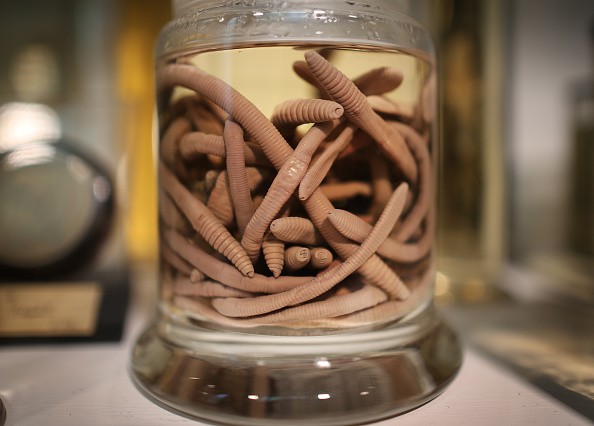Scientists and researchers want to use parasites to improve the ecosystems. Many of these creatures are very helpful, especially in medical activities.
For example, medical experts are using medicinal leeches to suck the patients' blood. Once they extracted the bad blood, the parasites are then sold off for bloodletting.

Earthworms are preserved at The Grant Museum of Zoology on September 4, 2012 in London, England. Containing 67,000 specimens, the Grant Museum of Zoology is the only one of it's kind in London. Started as a teaching collection in 1828 the collection displays only about 5% of all the specimens it holds.
The use of leeches became popular in the 1800s. However, a problem arrived in the 1900s. These parasites almost became extinct, forcing scientists to make a coordinated effort to save them.
Leeches are just one of the beneficial parasites. As of the moment, only 4% of this creepy crawlies are known to infect humans. These include ticks, fleas, and tapeworms.
"It's not the sort of thing WWF or Conservation International is going to be doing work on," said Colin Carlson, a Georgetown University's researcher, via The Guardian.
How parasites could help ecosystems
Many scientists consider parasites as puppet masters. Why? Because they tend to shape ecosystems by changing the behavior of their host animals.
According to PNAS's published study, 78% of parasites dominate the animal lifestyle. However, most food webs don't discuss this.

Cheddar cheese flavored worms are ready for snacking at the third annual "Big Bug Out" at Miami Metrozoo, May 5, 2001 in Miami, Florida. The event was an opportunity to learn about insects, the most numerous of all species on Earth. Exotic, native, live and mounted, this bug affair had them all, including some scrumptious bug-tasting opportunities.
Currently, there are around 80 million parasite species in the world, but only 10% of them are identified.
"When we think about plants and herbivores and carnivores, there are parasites operating on every part of that food web - they're this kind of dark matter," explained Carlson.
He added that conservationists are not providing enough interest and public support in parasites.
The Global Parasite Project
Because of the benefits that parasites can provide, scientists are planning to launch the Global Parasite Program. This project is expected to identify half of the world's parasites so that many researchers and other experts can observe them even more.
The upcoming project would train and bring taxonomists to work together across different institutions and countries. Once they are knowledgeable enough, these experts are expected to create one big joined-up collection.
As of the moment, many funders are interested in the upcoming global catalogs of the parasites.
For more news updates about new animal studies, always keep your tabs open here at TechTimes.
Related Article: Scientists Insert Human Genes In Monkeys' Brains to Make Them Larger and Have More Wrinkles
This article is owned by TechTimes,
Written by: Giuliano de Leon









